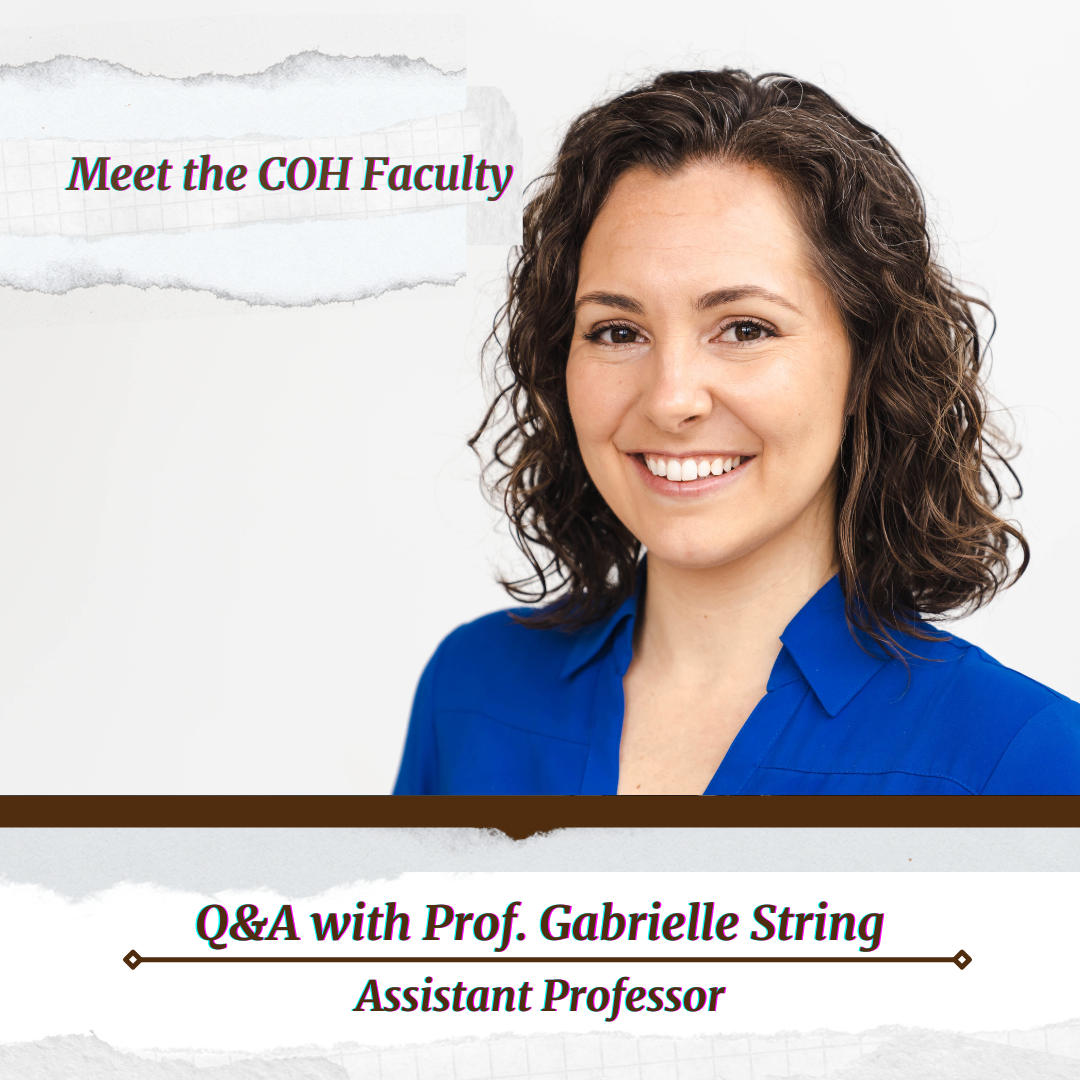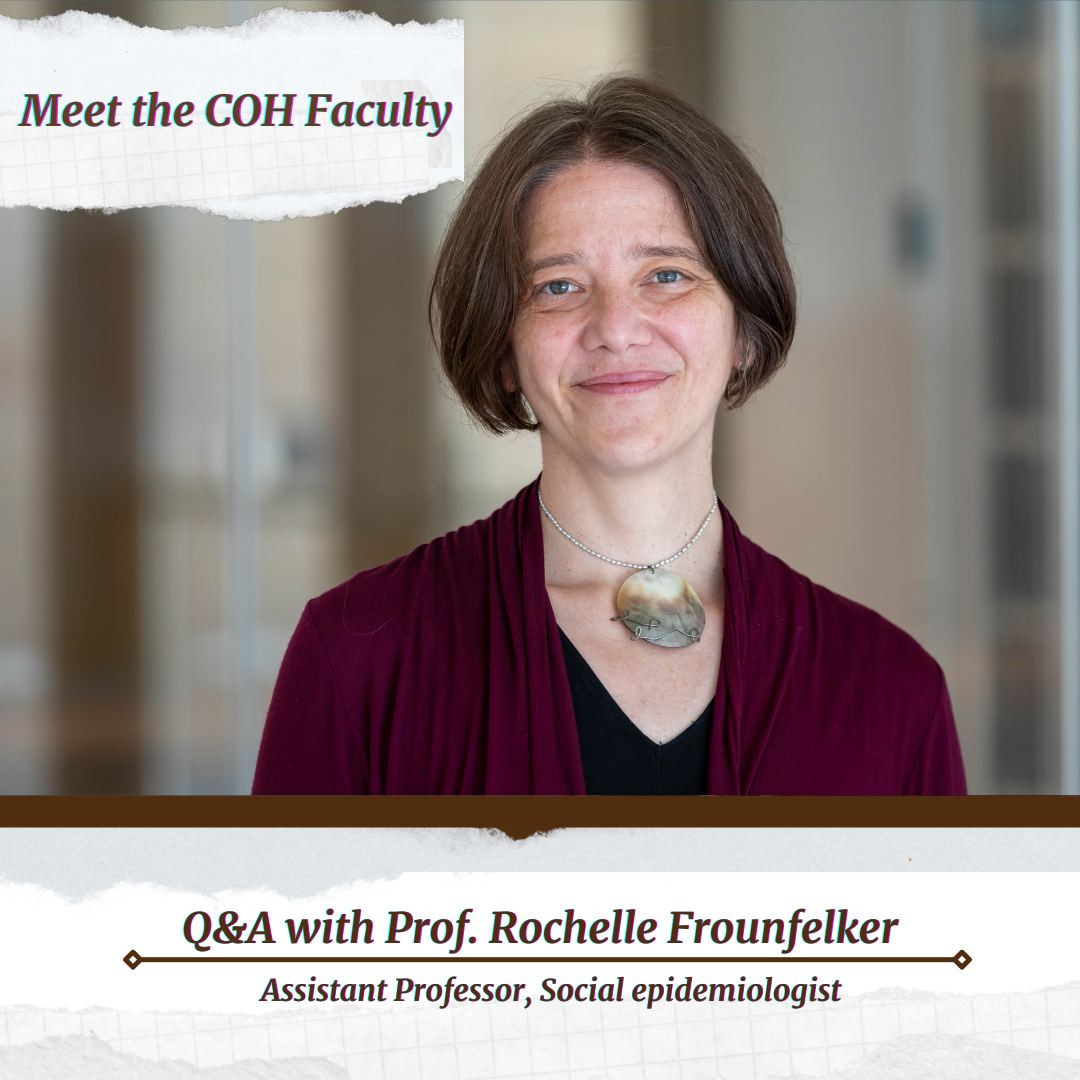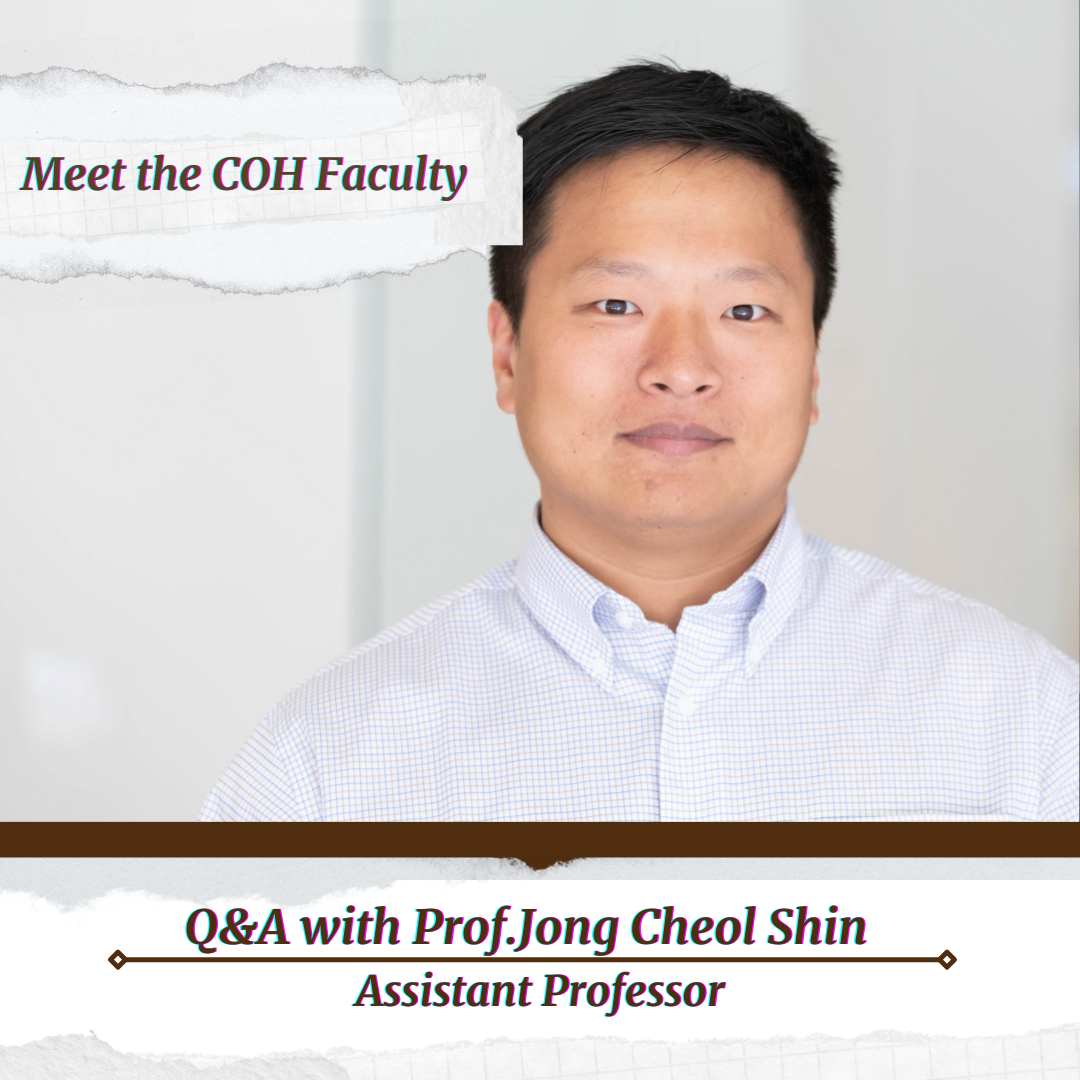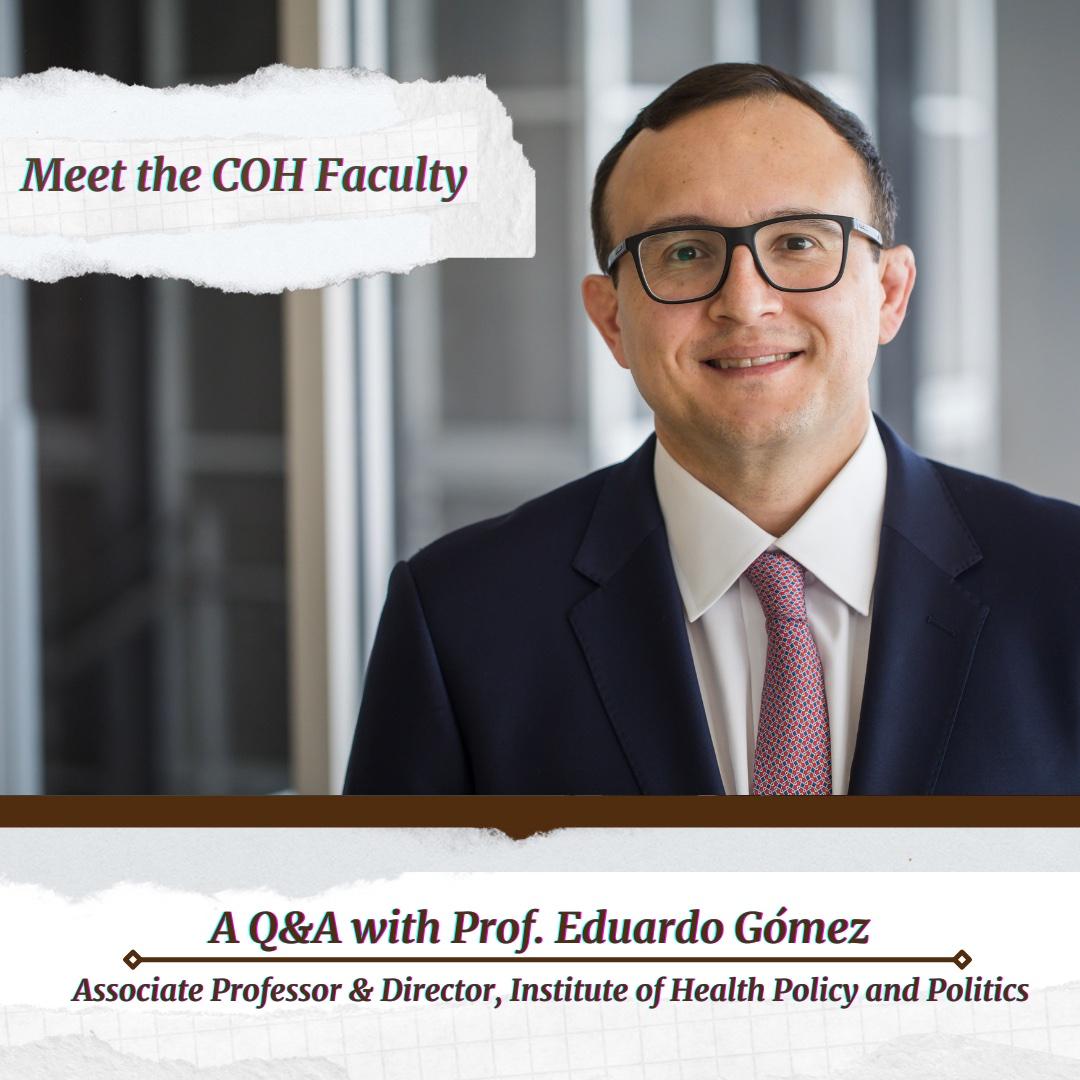
Faculty profile: Meet Gabrielle String
By Max DeCaro '25
Dr. Gabrielle String is an Assistant Professor with a joint appointment in Lehigh University’s College of Health and P.C. Rossin College of Engineering and Applied Sciences. Dr. String grew up outside Harrisburg, PA and considers herself to be from Boston, MA due to her extensive time learning and working there. She obtained her B.S. from Clarkson University in 2011, her M.S. from Tufts University in 2013, and her Ph.D. from Tufts University in 2017, all in Mechanical Engineering.
Dr. String is an environmental health engineer with a primary research focus in WASH (Water, Sanitation, and Hygiene). Her research is focused on closing the evidence gaps which exist in WASH for the delivery of efficacious and effective programs. Her work includes employing laboratory-based research to explore intervention efficaciousness and utilizing mixed-methods to evaluate WASH program effectiveness in real world settings. Much of Dr. String’s work is in low-resource and humanitarian contexts and often in collaboration with community partners.
What did your educational journey look like?
String: I am a first gen student and I had no idea what going to college meant, or what to do when I went to college. One thing I really liked doing in high school was participating in science fairs, and my 18 year-old self went: “well, scientists are really theoretical, but engineers get to build and do things with science and use their hands, so I think I want to become an engineer.” When I went to Clarkson University for my bachelors degree I didn’t know what type of engineer I wanted to be. They had this program for freshmen where you could trial a lot of different majors, and (admittedly by process of elimination) I ended up choosing mechanical engineering because I felt like it was a broad enough field where I could do a lot of different things with it. Simultaneously, I was working with a grad student and a new assistant professor on a project related to household water quality in a rural community in Ecuador. By the time I was a senior I realized that I really liked using my engineering skill set to tackle challenges in low-resource contexts and I wanted to embrace a career that would leverage engineering and technology in service to humanity. In particular, I didn’t like seeing the large disparities and growing gaps in basic services; I wanted to learn how to use engineering to close gaps in low-resource contexts. I went to grad school to learn more about this; although I did my M.S. and Ph.D. in mechanical engineering, I also had the opportunity to complete research in an interdisciplinary program looking at water in society. Ultimately, my dissertation focused on two different but interrelated things: ceramic water filters used in household water treatment and rural implementations of community-managed Water Safety Plans. At this point, my work was steering in the direction of my interests but I still felt that I did not have the training that I needed, so I did a postdoc with Daniele Lantagne’s group to specialize in WASH and humanitarian response. From there, I had the opportunity to really grow a skill set balancing experiments in the laboratory and field, while focusing on applications specific to humanitarian response.
What did you do before joining Lehigh?
String: I served as research faculty at Tufts University before coming to Lehigh, in an environmental health engineering sub-department. During COVID, Prof. Lantagne and I started a consulting lab to complete COVID-related research for USAID’s Bureau of Humanitarian Assistance. Also before joining Lehigh, I worked and volunteered with an urban watershed in the Boston area, and that to me was a really awesome experience because I got to understand how this small organization grew immensely through community-based programming and community-driven advocacy.
What is the focus and context of your research?
String: So generally my research work has always been in WASH, and most of my research questions come from actors and implementers in the humanitarian response space. The exact project topics change all the time, along with the locations of projects, and that is an interesting challenge with my research area. Different contexts have different needs and different WASH programs that are implemented to address those needs. Historically, there was not a lot of research completed in humanitarian settings; often programs were put in place because an implementing organization had experience with that program previously. But, unfortunately, humanitarian crises are increasing in number and duration. That means that there is a real opportunity to work to understand the ways that these programs are being implemented, particularly in WASH, and if they’re being done in a way that is evidence-based. I think it is fantastic that both program funders and implementing organizations are interested in making programs more effective and sustainable through evidence generation. My work is predominantly on water and hygiene, at either a community management level or a household level. Most often my group works in rural communities, communities hosting internally displaced people, or refugee camps. In water, we work on water supply and treatment programs from the community to the household levels. In hygiene, we work on surface disinfection, looking at pathogen spills in healthcare facilities and household settings. In general, our specific research project questions are often generated by humanitarian responders. My group uses a mixed-methods approach to answer questions about the efficacy of different water and hygiene processes in a laboratory environment and to answer questions around the effectiveness of these interventions in the field by evaluating programs as they are being implemented. Most of our research projects are very practical and seek to address real concerns from our partners in the response community.
What are some projects that you are hoping to work on?
String: Here at Lehigh my group is currently working to build out three research projects. The first is around safe water storage and understanding the last step in the water chain before consumption as we know that water storage is linked to recontamination of drinking water. Most programs recommend storing water safely, but what does that actually mean and how do we ensure that water storage containers, such as Jerricans, are clean? The second project we’re working on is strengthening the evidence-base for Drinking Water Safety and Security Plans in community-managed water supplies, particularly in programs where they are trying to integrate aspects of climate and disaster resilience. Lastly, we’re working on generating laboratory efficacy data around glove disinfection protocols in healthcare facilities and other forms of environmental disinfection in healthcare facilities, following guidelines developed for Ebola treatment units. Additionally, I’m very excited about starting a collaboration with my colleagues here in the College of Health looking at WASH insecurity and the relationship to mental health. I’m really excited about this work because humanitarian responders are identifying that this is an overlooked area, and I think we can build on strengths within the College to collaboratively tackle these research questions.
What classes are you currently teaching, and what classes do you plan on/hope to teach in the future?
String: Last semester I taught a class in the department of Civil and Environmental Engineering called “Environmental Case Studies.” It was a course for upperclassmen to learn how to evaluate different stakeholder perspectives using a critical lens and to consider how multifaceted and challenging it is to develop solutions to complex environmental issues. This semester I’m teaching a class called “Community Health and Engineering,” and I’m very excited for this one because I’ve had enrollment of students majoring in a variety of different programs. The goal of the class is to start students off with a foundation of understanding different public health concerns and the ways that we can implement engineering controls to address them, while also learning that engineering solutions have their limitations.
What are your hobbies?
String: Being a new professor is a lot of work, but I do love gardening and was working on a Master Gardening training before I moved here. I’m particularly passionate about native species and educating myself and others on their importance. Growing up I used to spend time in my grandparents’ huge vegetable garden, so I’ve always loved being in the soil and feeling connected to the Earth.
Cats or dogs?
Dr. String: I’m gonna say both! I do love both cats and dogs — I went to the Hideaway Cafe today so that I could have an excuse to meet the new campus therapy dog. I also have two cats named Versace and Armani who both have their own incredible personalities and I love them very much.


